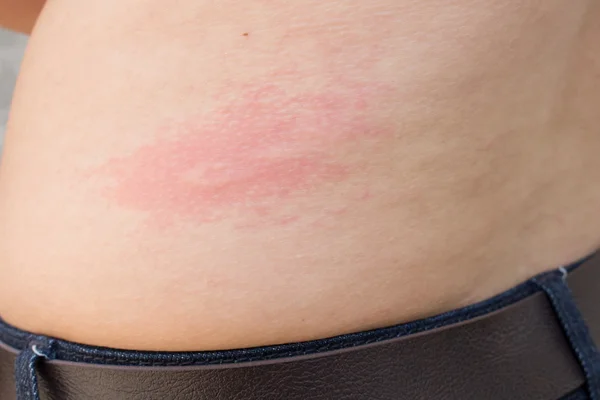Herpes is a common virus that causes a contagious skin rash. It is caused by the herpes simplex virus (HSV) and can occur on any part of the body. There are two types of herpes viruses: HSV-1, which typically causes cold sores, and HSV-2, which causes genital herpes. In this article, we will discuss the causes, symptoms, identification, diagnosis, treatment, and prevention of herpes skin rash.
Introduction
Herpes skin rash is a contagious viral infection that affects the skin. It is caused by the herpes simplex virus (HSV), which is highly contagious and easily transmitted through skin-to-skin contact. The virus can be spread through kissing, sharing of utensils, or through sexual contact. Herpes skin rash typically causes small blisters or sores on the skin, which can be painful and uncomfortable.
Don’t miss | Human Papillomavirus (HPV) Everything You Should Know
Causes of Herpes Skin Rash
Herpes skin rash is caused by the herpes simplex virus (HSV), which can be transmitted through skin-to-skin contact. The virus can be spread through kissing, sharing of utensils, or through sexual contact. The virus can be transmitted even when there are no visible symptoms, making it highly contagious.
Symptoms of Herpes Skin Rash
The symptoms of herpes skin rash may include small, painful blisters or sores on the skin, fever, swollen lymph nodes, headache, and muscle aches. The blisters can be filled with fluid and can burst, causing the virus to spread to other parts of the body. The symptoms typically appear within 2-20 days after exposure to the virus and can last up to several weeks.
Identification of Herpes Skin Rash
Herpes skin rash is typically identified by its characteristic appearance. The rash may appear as small, painful blisters or sores on the skin, which can be filled with fluid and may burst, causing the virus to spread. The rash may also be accompanied by fever, swollen lymph nodes, headache, and muscle aches. A doctor may also perform a physical exam and take a sample of the blister fluid for testing to confirm the diagnosis.
Diagnosis of Herpes Skin Rash
The diagnosis of herpes skin rash is typically made based on the appearance of the rash and the presence of other symptoms. A doctor may also perform a physical exam and take a sample of the blister fluid for testing to confirm the diagnosis. Blood tests may also be done to detect the presence of the herpes simplex virus antibodies in the blood.
Treatment of Herpes Skin Rash
There is no cure for herpes skin rash, but antiviral medications can be used to reduce the severity and duration of the symptoms. Over-the-counter pain relievers can also be used to alleviate pain and discomfort. It is important to keep the affected area clean and dry to prevent the virus from spreading. People with herpes skin rash should also avoid sexual contact until the sores have healed to prevent spreading the virus to their partners.
Prevention of Herpes Skin Rash
The best way to prevent herpes skin rash is to avoid skin-to-skin contact with people who have active herpes lesions. Using condoms during sexual contact can also help reduce the risk of contracting the virus. It is also important to practice good hygiene, such as washing hands frequently and avoiding sharing utensils or personal items with others. People who have herpes skin rash should take precautions to prevent spreading the virus to others, such as avoiding sexual contact and wearing clothing that covers the affected area.
Complications of Herpes Skin Rash
Herpes skin rash can lead to a number of complications, such as the development of secondary infections, scarring, and nerve damage. In rare cases, the virus can also cause inflammation of the brain (encephalitis) or inflammation of the liver (hepatitis). People with weakened immune systems, such as those with HIV/AIDS or undergoing chemotherapy, are at higher risk of developing severe complications from herpes skin rash.
Read more | Chronic anal fissure symptoms and causes
Conclusion
Herpes skin rash is a contagious viral infection that affects the skin. It is caused by the herpes simplex virus (HSV) and can occur on any part of the body. The symptoms may include small, painful blisters or sores on the skin, fever, swollen lymph nodes, headache, and muscle aches. While there is no cure for herpes skin rash, antiviral medications can be used to manage the symptoms. It is important to practice good hygiene and avoid skin-to-skin contact with people who have active herpes lesions to prevent contracting the virus.
Herpes Skin Rash FAQs
A: No, there is currently no cure for herpes skin rash, but antiviral medications can be used to manage the symptoms.
A: Herpes skin rash is typically diagnosed based on the appearance of the rash and the presence of other symptoms. A doctor may also perform a physical exam and take a sample of the blister fluid for testing to confirm the diagnosis.
A: The best way to prevent herpes skin rash is to avoid skin-to-skin contact with people who have active herpes lesions. Using condoms during sexual contact can also help reduce the risk of contracting the virus.
A: People with herpes skin rash should avoid sexual contact until the sores have healed to prevent spreading the virus to their partners.
A: If you think you may have herpes skin rash, you should see a doctor for diagnosis and treatment.









